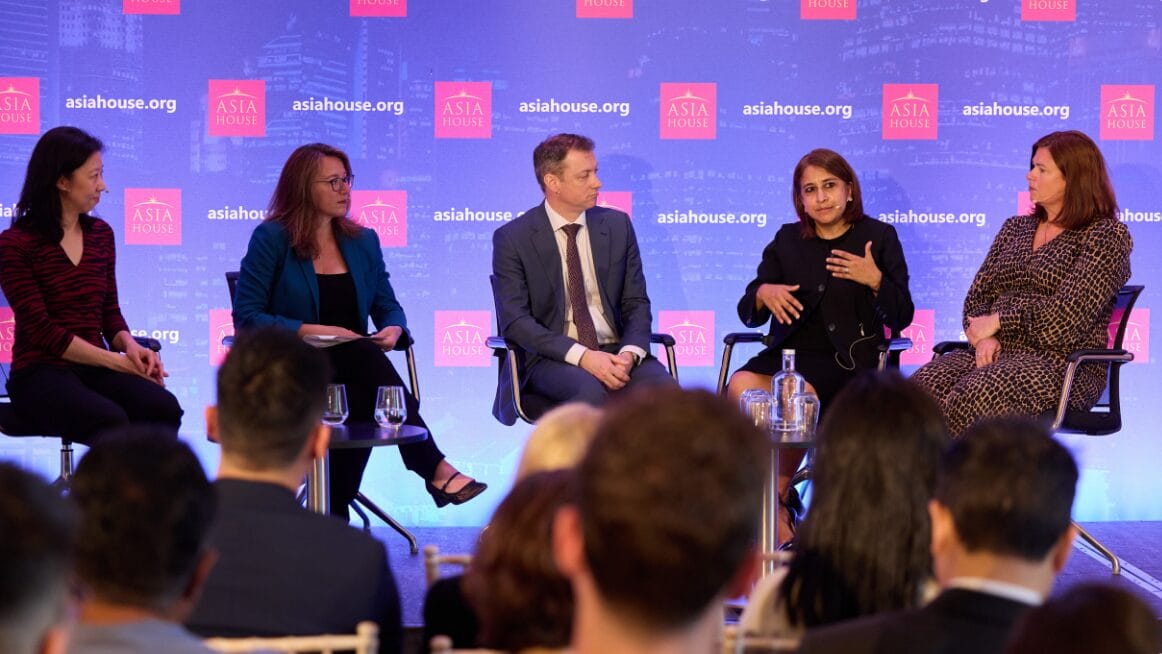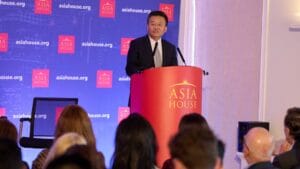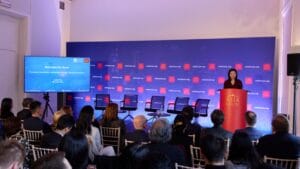Driving commercial and political engagement between Asia, the Middle East and Europe
Driving commercial and political engagement between Asia, the Middle East and Europe
Driving commercial and political engagement between Asia, the Middle East and Europe

The efforts to move towards a more sustainable global economy and divergence in compliance between China and the West were discussed by business and policy leaders at a hybrid conference at Asia House – held in partnership with Cheung Kong Graduate School of Business (CKGSB) – on Wednesday 29 May.
Lord Green, Chairman of Asia House, indicated in his opening remarks that “sustainability, whether in China or the West, is a global concern for us all”. He indicated that companies should take action to integrate sustainability into their business planning so that any strategy for profit maximisation incorporates sustainable actions, adding that the increasing importance of sustainability was being driven by the growing demand from consumers, shareholders, employees, and the regulatory environment for businesses to adopt more sustainable practices. The topic of sustainability remained crucial, and it was imperative that “we get it ‘right’ in the decades to come”, he added.
 In his keynote speech, Aimin Yang, General Manager, China Construction Bank London Branch, suggested that the UK was an important leader in international strategic sustainability, adding that it had been the first G20 country to have required transparent climate change disclosure from corporations and financial institutions. He added that China had pledged to achieve carbon neutrality by 2060 and had adopted a strategic approach to sustainable development that aligned closely with the UK. Yang indicated that China had established a multi-tier green finance system.
In his keynote speech, Aimin Yang, General Manager, China Construction Bank London Branch, suggested that the UK was an important leader in international strategic sustainability, adding that it had been the first G20 country to have required transparent climate change disclosure from corporations and financial institutions. He added that China had pledged to achieve carbon neutrality by 2060 and had adopted a strategic approach to sustainable development that aligned closely with the UK. Yang indicated that China had established a multi-tier green finance system.
Yang also spoke of the global efforts needed to combat climate change and stressed that “any discussion on climate change must include China”, concluding that climate change was a global challenge and required broad cooperation.
In a presentation by Professor Zhu Rui, Director of ESG and Social Innovation Center at CKGSB on her research ‘Business for Good’, she highlighted how enterprises could integrate ESG factors into their corporate strategies.
 Professor Zhu, well known in China for her mentoring of successful business leaders, highlighted the three core pillars that were critical for enterprises to implement ‘Business for Good’ – the values of shared benefits, institutional support, and integrating core business with societal concerns. Professor Zhu added that entrepreneurs could easily integrate these pillars by following her newly developed ESG assessment map, which was developed in response to the complexity of mainstream ESG guidelines. She explained that entrepreneurs could start to do ‘business for good’ by following this tool to identify which ESG ‘topics’ they needed to address, concluding that it was in fact “the process of theory informs practice and practice refines theory”.
Professor Zhu, well known in China for her mentoring of successful business leaders, highlighted the three core pillars that were critical for enterprises to implement ‘Business for Good’ – the values of shared benefits, institutional support, and integrating core business with societal concerns. Professor Zhu added that entrepreneurs could easily integrate these pillars by following her newly developed ESG assessment map, which was developed in response to the complexity of mainstream ESG guidelines. She explained that entrepreneurs could start to do ‘business for good’ by following this tool to identify which ESG ‘topics’ they needed to address, concluding that it was in fact “the process of theory informs practice and practice refines theory”.
Efforts to establish a consistent global ESG framework were further discussed in a panel discussion with Professor Zhu Rui alongside Mallika Ishwaran, Chief Economist at Shell; Sherry Madera, Chief Executive Officer at CDP – one of the world’s leading disclosure platforms; and Jane Goodland, Group Head of Sustainability at London Stock Exchange Group (LSEG).
Madera highlighted current trends in data disclosure and echoing Yang, indicated that disclosing climate data was increasingly treated as a core part of business activity. By disclosing climate data and committing to transparency, companies were able to understand their business operations more comprehensively, thereby improving business decisions, governance, and ultimately lowering their emissions while yielding more efficient results. As an example, Madera indicated that in China CDP had worked with entrepreneurs and helped them “lower their emissions by over 600 million tons”.
 Jane Goodland noted that LSEG was seeing more investors call for consistency in comparable climate disclosure data and information to make their investment decisions. “Recently, [LSEG] launched a call to action making very clear that it’s our wish that we see the adoption of the International Sustainability Standards Board (ISSB) or similar, and 120 investors have joined us in that call for action”, said Goodland, indicating that consistency was essential to move towards a more sustainable economy and to enable investors to accurately assess and compare the climate-related performance and risks of different companies. This standardised approach was crucial for driving effective decision-making and fostering a transparent market environment, she said.
Jane Goodland noted that LSEG was seeing more investors call for consistency in comparable climate disclosure data and information to make their investment decisions. “Recently, [LSEG] launched a call to action making very clear that it’s our wish that we see the adoption of the International Sustainability Standards Board (ISSB) or similar, and 120 investors have joined us in that call for action”, said Goodland, indicating that consistency was essential to move towards a more sustainable economy and to enable investors to accurately assess and compare the climate-related performance and risks of different companies. This standardised approach was crucial for driving effective decision-making and fostering a transparent market environment, she said.
Shell’s Mallika Ishwaran highlighted the perceived trade-offs between climate change and economic growth. “If you take climate action today, somehow, you’re hampering growth. If you want to secure growth, you need to start minimising the impacts of catastrophic climate change”, she said, indicating that here were many opportunities to do this, such as deploying industrial policies and sourcing low-carbon solutions.
The panel, moderated by Asia House Director of Corporate Affairs Charlie Humphreys, also addressed the divergences between China and the West. Ishwaran noted that approaches to energy transition in China and Europe are very different, and based on Shell’s experience, by working through different scenarios, they could deliver the best practice that complements both sides. Sherry Madera also expressed that CDP had seen a significant expansion of disclosure by Chinese companies who are being asked by their customers to supply climate data.
Goodland spoke about the gaps in carbon accounting and reporting. She explained that LSEG had seen rapid growth in sustainable finance from Chinese companies, but stressed that there was still a long way for large and medium companies to go in publishing the scale and breadth of information needed for full compliance. Bridging these gaps would be essential for building investor confidence and ensuring that sustainable finance can effectively contribute to global climate goals.
Watch the full video of the conference here.
Asia House helps organisations position themselves on key issues by curating high-level discussions with senior speakers and audiences.
For more information about our thought leadership and positioning services, please contact Katie Reid, Stakeholder Engagement Associate at: katie.reid@asiahouse.co.uk.
